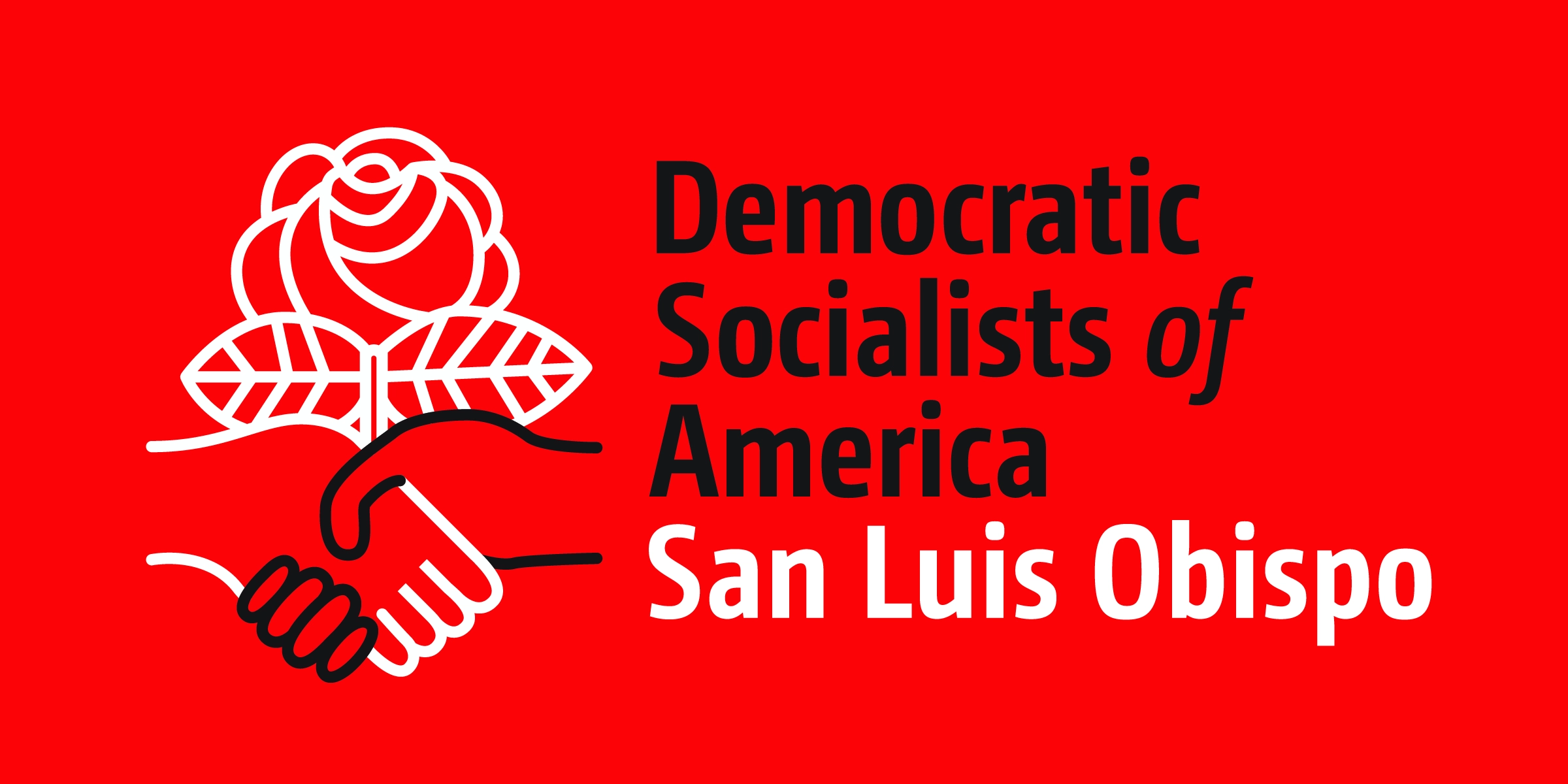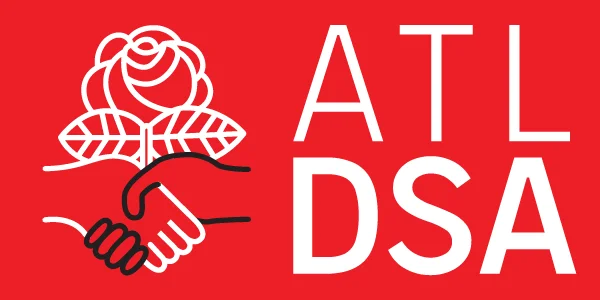
Disaster Monopoly Capitalism
You’re listening to Revolutions Per Minute BACK LIVE on WBAI, a socialist radio show and podcast from members of New York City Democratic Socialists of America.The Democratic Socialists of America is the largest socialist organization in the United States, with 56,000 members nationwide and NYC-DSA is its biggest chapter. We are run by our 5,500+ members and organizers who are working together to build democratic socialism in all five boroughs..


San Luis Obispo Democratic Socialists of America (SLO DSA) Public Comment to the SLO City Council
Good evening Mayor Harmon and city council members. My name is Ethan Stan, and I am speaking this evening on behalf of the San Luis Obispo chapter of the Democratic Socialists of America, or SLO DSA.
DSA chapters across the state organize around housing issues, and our chapter is no exception. We believe housing is a human right, and that a housing-first approach should be at the core of our City and County’s efforts to eliminate homelessness and housing insecurity in our community. We recognize and appreciate the effort of the SLO City Council and other local governments to address this issue—many of which were outlined in a SLO Tribune article written by council member Christianson and Vice Mayor Pease on March 21, 2019. Unfortunately, we do not believe these efforts are enough to make a dent in the housing crisis in our community
There is, however, one thing we believe the City Council can do to ease the enormous pressure put on our homeless and low-income neighbors: repeal Chapter 10.34 of the City Municipal Code, also known as the overnight car camping ban.
The car camping ban has been on the City’s conscience for years—thankfully, in 2012, the City loosened the ban by reducing penalties from a criminal violation to a parking ticket and fine of $100.
However, even this goes too far. We live in a city with an $11–12 minimum wage, where homeless and low-income residents have to cobble together 2–3 part-time jobs to even approach 40 work hours per week. Even if someone works full-time, their take-home wages are devoured by our city’s astronomical rents and high cost of living. In the event of a lost job or eviction, a car is often the last significant piece of personal property people have. If the City of SLO does not want these people sleeping at the edges of our city—under bridges, in parks, and in doorways—then their car is the last resort for a safe place to sleep, an incredibly basic human right. To add hundreds of dollars in fines on top of those already dire circumstances is immoral, and we are better than that.
As of this moment, the City of SLO is telling our residents “Go it alone. Don’t be homeless. And if you are, move somewhere else.” As a community that prides itself on being progressive, inclusive, and welcoming, this ordinance cannot be farther from who we say we are. And for that reason, the SLO DSA demands the City Council to repeal the overnight car camping ban.
Please, do not allow our City’s Code to kick struggling SLO residents while they are down. Thank you.


Tabling for Bernie at Morehouse
MADSA was in the house at the Bernie Sanders for President rally at Morehouse College on Nov. 21. We joined thousands of other Bernie fans, inspired by his political vision of Medicare for All, Collegefor All, a Green New Deal, and Workplace Democracy.
“Table got taken down, but the clip-boarding was very successful,” said MADSA officer Cole Reardon.”Sometimes it’s actually nice preaching to the choir.” Word is we signed up 200 people interested in joining our chapter!
See Bernie’s talk here. (Photos: Steve Eberhardt. Video: Georgia Grassroots Video.)

The Revolutionary Situation in Latin America
You’re listening to Revolution Per Minute on listener sponsored WBAI in NYC broadcasting at 99.5 FM and streaming on your favorite podcast app. To connect with us after the show you can email us at revolutionsnyc@gmail.com or sign-up for our newsletter to get links to what we talk about on the show. You can do that on at our website revolutionsperminute.simplecast.com. You can also find us on twitter @nycRPM.


Sara Nelson Inspires Us As We Honor Our Leaders
MADSA’s 13th annual Douglass-Debs awards dinner at Paschal’s restaurant Nov. 9 was a great success. The dinner has been our main fundraiser, enabling us to help our allies and pay our expenses, while honoring leaders of our progressive community and networking with friends and fellow activists from the unions, civil rights and other movements.
This year’s keynote speaker was Sara Nelson, international president of the Association of Flight Attendants-CWA, AFL-CIO. That title doesn’t begin to suggest her inspiring, yet down-to-earth oratory, lifting all of us to support labor’s struggles — an especially relevant message right now, as her union just launched a campaign to organize Delta workers! She quoted widely from historic figures such as Mother Jones, Fredrick Douglass and Eugene Victor Debs, and from her own experience as a worker and a woman, assuring us that “Solidarity is stronger than gravity!” Watch her speak here!

Other moving tributes followed to the awardees:
1) The Highlander Research and Education Center, a key resource for progressive organizers since the 1930s (now located in New Market, TN) lost their main building to a right-wing arson attack earlier this year but continues their work undeterred. Member Eric Robertson explained that the award recognizes the continued importance of the center to the current movement for human rights, worker rights and racial justice as well as its role in nurturing such historic figures as Martin Luther King, Jr. and Rosa Parks. As the Center was holding its own board meeting that weekend, Annie Thomas, regional organizer for Project South, accepted the award in Highlander’s behalf.
2) Georgia State Representative Renitta Shannon was recognized for her courageous service as one of a few progressive members of the Georgia General Assembly, standing up for women’s reproductive rights, LGBTQ rights, and immigrant rights. Her friend Charmaine Davis, SE regional administrator of the U.S. Dept. of Labor’s Women’s Bureau, recalled her friendship with Renitta and the awardee’s inspiring career.
3) To top off the celebration, we gave one of our special awards — for “creative activism” — to our own Daniel Hanley, well known for his leadership in every kind of direct action, most recently with the Light Brigade, which provides illuminated signage and projects uplifting slogans onto Atlanta’s night-time cityscape during demonstrations. MADSA founder Milt Tambor presented the award by noting many instances of Daniel’s commitment, courage and creativity — the essential makings of an activist — since he joined MADSA several years ago.

¡Trabajadores de Todos los Países, Unidos!
You’re listening to Revolution Per Minute on listener sponsored WBAI in NYC broadcasting at 99.5 FM and streaming on your favorite podcast app. To connect with us after the show you can email us at revolutionsnyc@gmail.com or sign-up for our newsletter to get links to what we talk about on the show. You can do that on at our website revolutionsperminute.simplecast.com. You can also find us on twitter @nycRPM.

RPM Underground: The Red Wave Collective
You’re listening to Revolution Per Minute Underground on listener sponsored WBAI in NYC broadcasting from the occupied studios and streaming on your favorite podcast app. To connect with us after the show you can email us at revolutionsnyc@gmail.com or sign-up for our newslettser to get links to what we talk about on the show. You can do that on at our website revolutionsperminute.simplecast.com. You can also find us on twitter @nycRPM


MADSA Lights Up Grant Park
On Nov. 1, Metro Atlanta Democratic Socialists of America brought our own “lanterns” to the Grant Park Halloween Lantern Parade, where observers broke into spontaneous chants of “ABOLISH ICE!” and “Bernie, Bernie!”
All the kids in costume wanted photos taken with the Bernie signs, clearly because they appreciate a political movement capable of addressing the apocalyptic crises of capitalism in their lifetime. (Or they just liked the cool glow of 400 LEDs.)
As small crowds gathered around the signs for photos, MADSA members shared details of Bernie’s agenda for democracy and socialism, along with buttons expressing related demands.


RPM Underground: Decolonize This Place!
You’re listening to Revolution Per Minute on listener sponsored WBAI in NYC broadcasting at 99.5 FM and streaming on your favorite podcast app. To connect with us after the show you can email us at revolutionsnyc@gmail.com or sign-up for our newsletter to get links to what we talk about on the show. You can do that on at our website revolutionsperminute.simplecast.com. You can also find us on twitter @nycRPM.


MADSA Endorses Andrea Cervone for Clarkston City Council
At our October 26th meeting, Metro Atlanta DSA voted to endorse member Andrea Cervone in her re-election campaign for Clarkston City Council. In her time on City Council, she has helped build Clarkston into one of the most progressive cities in the South. In this election, she hopes to win a mandate to broaden the coverage of Clarkston’s non-discrimination ordinance to protect workers on housing assistance; to extend the right to vote in municipal elections to all lawful residents, not just citizens; and to expand the city’s recently piloted participatory budgeting program.
MADSA members plan to help canvass for Andrea in Clarkston on Sunday, November 3rd, ahead of the November 5th election day. MADSA chair Councilman khalid, who serves on the City Council of South Fulton, said he hopes MADSA can become a strong voice in local politics while also continuing our efforts for Bernie Sanders’ presidential candidacy. If you’re interested in running for office or helping with MADSA’s electoral work, contact the electoral committee via email at electoral@madsa.ga.
(MADSA electoral committee breakout session at meeting. Photo: Reid Freeman Jenkins)
